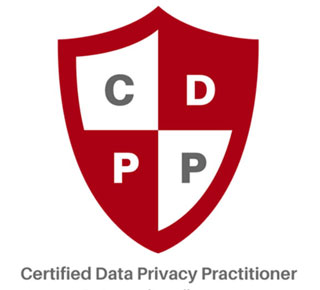Certified Data Privacy Practitioner (CDPP)

Data privacy and data security are the similar terms. Data privacy is a part of data security and is identified with the proper handling of data - how you gather it, how you use it, and maintaining compliance. Data security is about access & protecting data from unauthorized users through various types of encryption, key management, and authentication.
The Certified Data Privacy Practitioner (CDPP) is 16 hours of online course, spread across 4 days 4 hours each which includes 15 hours of training session followed by 1-hour online examination and is designed to impart knowledge about the requirements of GDPR & IDPA.
The CDPP training course covers 8 Data Privacy guidelines and laws such as GDPR, IS0 27701, and IDPA. The training shall provide a hands-on experience on how to implement security controls to protect customers Personal Information (PII).
Upon completion of the training, the participant would have an in-depth knowledge of the local and global data privacy guidelines, its importance and implementation. Below is the Table of Contents for the training.
Objective of the program:
- Overview of privacy and data protection for the global organization
- Provide methods for protecting privacy using the Fair Information Principles
- Identify local and global laws and regulations that pertain to data protection
- Identify strategies for managing compliance issues related to different privacy laws and data protection acts
- Implementing data security in practice
- A useful privacy framework
Table of Content:
Part 1:- Introduction to GDPR
- Principles of GDPR and data subject rights
- Concept of data protection impact assessment
- Liabilities and penalties of GDPR
Part 2:
- Overview of ISO 27701: The International Standard for Data Privacy
- Introduction to the Data Protection Act of India
- Terms and definitions of the local data protection laws.
- Applicability and jurisdiction of the local data protection laws
- Principles of local data protection laws.
- Liabilities and penalties of local data protection laws.
Part 3:
- Data protection Implementation guidelines
- Identifying PII in your organization
- Inventorying PII and assigning ownership
- Developing security controls to ensure compliance with local data protection laws, GDPR, and IDPA.
- GDPR Privacy Impact Assessment
Part 4:
- Appointing a Data Privacy Officer (DPO)
- Roles and responsibilities of the DPO
- Developing appropriate policies and procedures
- Board and senior management oversight on the privacy program
- Measuring the success of your privacy program